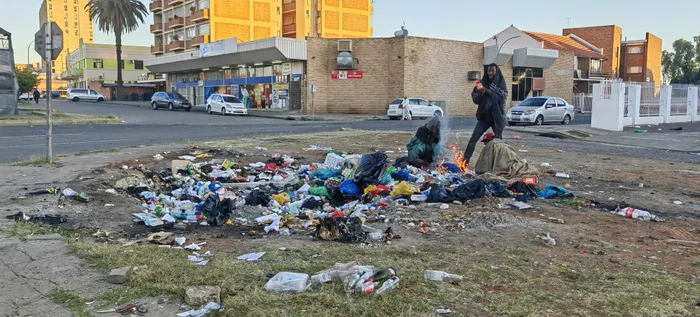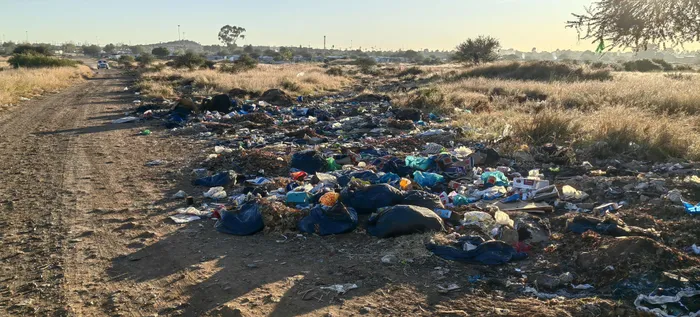‘Enough is Enough’: Residents demand action on Kimberley’s dumping crisis

Dumping in and around Kimberley has become an eyesore, sparking concerns from residents, businesses, and activists. In this image, people are seen scavenging through rubbish at the corner of Regiment Way and Cricket Street.
Image: Danie van der Lith / DFA
ILLEGAL dumping in Galeshewe, the CBD, and suburbs has reached a boiling point, with Kimberley residents, activists, and even some municipal officials raising the alarm over growing health and safety risks in the community.
What started as an issue of unsightly litter has now escalated into a broader social and environmental crisis, one that many say reflects both neglect and deep disrespect for the workers trying to clean up the mess.
On any given day, heaps of household waste, rotting food, construction rubble, and discarded furniture can be seen littering sidewalks, open spaces, and even residential streets. Community members say the situation has spiralled out of control, especially near popular dumping hot spots that now attract waste scavengers and pose serious risks to public health.
“We are tired,” one resident told the DFA. “Every time we clean, it gets worse the next day. There are scavengers pulling trash out of the bins and spreading it all over. It’s dangerous – especially for our children who play nearby.”

Dumping has become a major concern, and residents are to blame for this shameful act. Rubble and garden waste is seen here in Green Street close to Riviera.
Image: Danie van der Lith / DFA
Behind the trash, however, are also stories of workers, mostly women employed through the Expanded Public Works Programme (EPWP), who face daily abuse, disrespect, and overwhelming volumes of rubbish.
In a scathing public statement titled “Enough is Enough – Respect Our Environment and Our EPWP Workers”, Gregory Nyongane from the Let’s Talk, Men Movement condemned the community’s failure to act.
“What is unfolding in Galeshewe and Kimberley as a whole is not just environmental neglect. "It is a moral crisis, a community failure, and a disgrace that we can no longer turn a blind eye to,” Nyongane said.
He expressed outrage at how EPWP workers are being treated: “Their job is to supplement municipal services, not to babysit a careless community.”
He noted that the daily routine of some residents involves throwing rubbish onto open land, knowing someone else will be forced to clean it up.
Nyongane’s call to action includes five specific demands:
- An immediate stop to illegal dumping across Galeshewe and Kimberley.
- Respect and protection for EPWP workers.
- Greater accountability from the municipality.
- Community-led clean-up campaigns.
- Fines and public exposure for illegal dumpers.
“This is your street, your neighbourhood, and your community. If you can’t respect it, then you are part of the problem,” Nyongane said.
Focus has also been placed on the management of the EPWP programme. Several residents in Riviera stated that while the EPWP programme is a very good idea, how it is being managed is the problem.
“There are so many EPWP workers, and they have the potential to make a real impact if deployed strategically across the suburb. But what we’re seeing instead is that 20 or 30 workers are dropped off at a single small area. Out of those, only five or six are actually working, while the rest sit idle. The EPWP supervisor should consider assigning smaller groups - five here, five there - across different zones. That way, a much larger portion of the suburb could be cleaned in a single day rather than just one small patch. They are being paid for the work they do. It all comes down to better management,”a resident said.
Scavengers, Landfill Chaos Add to the Problem
Adding to the community’s concerns are the waste scavengers, many of them jobless and desperate, who comb through garbage to find recyclable items or food. While their presence speaks to deeper socio-economic issues, residents say they’re often left with the consequences: scattered rubbish, clogged stormwater drains, and blocked walkways.
“The scavengers rip open the bags looking for plastics and tins. But they leave everything else strewn across the road,” said one homeowner in Riviera. “It’s a mess, and it’s getting worse.”
Similar frustrations have been voiced about the municipal landfill site, which residents say is poorly managed and chaotic. Some complain of limited access, while others raise concerns about health and safety practices on-site, as well as their safety. This has led many to dump their refuse illegally rather than travel the long distance and navigate the complicated process at the official site.
Sol Plaatje Municipality Responds
In response to the outcry, Sol Plaatje Municipality issued a detailed statement outlining its current waste management strategy and long-term goals.
Spokesperson Thabo Mothibi emphasised that waste management is a constitutional responsibility of local government and that the Cleansing Division is “legislatively compelled to deliver a weekly kerbside refuse removal service and manage solid waste.”
He outlined the municipality’s current operations:
- Daily mechanical sweeping, sidewalk cleaning, and litter picking in the CBD.
- Bulk waste removal and response to illegal dumping.
- Support from EPWP workers for manual cleaning and bin emptying.
- Targeted enforcement for businesses and unregulated vendors.
Mothibi acknowledged the role that unregulated businesses, especially those operating outside standard hours, play in worsening the situation, particularly in the CBD. He called for tighter enforcement and stricter trading permit systems, noting that “many businesses dispose of their waste after municipal cleaning teams have finished their shifts.”
As for the landfill site, Mothibi said municipal staff control access, while machine operators are employed by private service providers. He admitted that new monitoring protocols and routine staff reviews are being implemented to improve safety and efficiency.
“Cleaning and Greening” Campaign on the Way
Despite the challenges, Mothibi confirmed that a new Cleaning and Greening Campaign will soon be launched in collaboration with the Department of Agriculture, Rural Development, Land Reform, and Environment. The campaign will include training opportunities for unemployed youth and aims to rejuvenate local “cleaning and greening clubs”.
“We will be stepping up efforts in ensuring that Kimberley regains its sparkle, and target the perennial polluters and litterers,” said Mothibi.
He added that Environmental Health Practitioners (EHPs) would take a more active role in public education and awareness.
The municipality is also exploring how to formally integrate waste pickers into the recycling economy, a move that aims to balance economic opportunity with hygiene and safety standards.
“We acknowledge the socio-economic role of waste pickers and are working on developing a way that will formalise their activities. The aim is to integrate them into the recycling value chain while enforcing regulations that ensure public health and safety,” Mothibi said.
A Shared Responsibility
Despite the municipality’s assurances, community leaders and activists insist that the core issue remains public behaviour.
“The state of our township is a reflection of our values,” said Nyongane. “Right now, it is a reflection of shame.”
As the debate over dumping intensifies, one thing is clear: without a change in mindset from both the community and the authorities, the piles of rubbish and the deeper problems they represent are unlikely to disappear.
As one Riviera resident said. “If you are guilty of dumping your rubbish, rubble and everything else next to a road or in the veld, then you are the problem, SIES!
Related Topics: